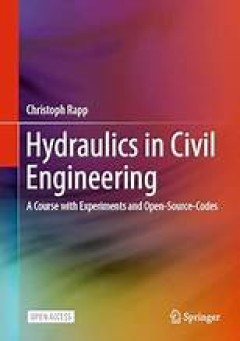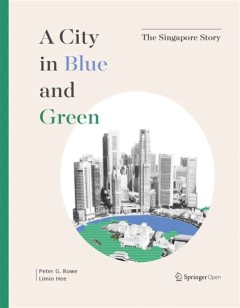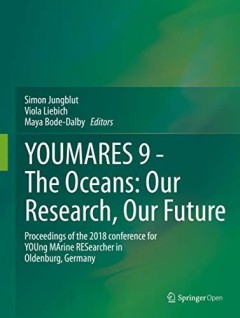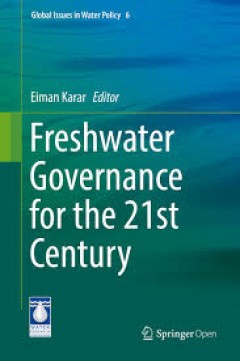Filter by

Ecosystem-Based Management, Ecosystem Services and Aquatic Biodiversity = T…
Aquatic ecosystems are rich in biodiversity and home to a diverse array of species and habitats, providing a wide variety of benefits to human beings. Many of these valuable ecosystems are at risk of being irreversibly damaged by human activities and pressures, including pollution, contamination, invasive species, overfishing and climate change. Such pressures threaten the sustainability of the…
- Edition
- 1
- ISBN/ISSN
- 9783030458430
- Collation
- VIII, 580 hlm; ill., lamp.,
- Series Title
- -
- Call Number
- -

Hydraulics in Civil Engineering
On the one hand, the book closes the gap between applied civil engineering hydraulics books and standard fluid mechanics works; on the other hand, it is designed as a course that can be applied modularly. The goal is to present the facts in an understandable and descriptive way and with experiments, software, and materials that are available anywhere.
- Edition
- 1
- ISBN/ISSN
- 978-3-031-54860-4
- Collation
- oer.unej.ac.id
- Series Title
- -
- Call Number
- XXIV, 383

Handbook of Pathogens and Diseases in Cephalopods
The aim of this open access book is to facilitate the identification and description of the different organs as well as pathogens and diseases affecting the most representative species of cephalopods focussed on Sepia officinalis, Loligo vulgaris and Octopus vulgaris. These species are valuable ‘morphotype’ models and belong to the taxonomic groups Sepioidea, Myopsida and Octopoda, which in…
- Edition
- 1
- ISBN/ISSN
- 9783030113308
- Collation
- XV, 230 ill; lamp
- Series Title
- -
- Call Number
- -

A City in Blue and Green The Singapore Story
This open access book highlights Singapore’s development into a city in which water and greenery, along with associated environmental, technical, social and political aspects have been harnessed and cultivated into a liveable sustainable way of life. It is also a story about a unique and thoroughgoing approach to large-scale and potentially transferable water sustainability, within largely ur…
- Edition
- 1
- ISBN/ISSN
- 9789811395970
- Collation
- X, 152 hlm; ill., lamp.,
- Series Title
- -
- Call Number
- -

Water-filtered Infrared A (wIRA) Irradiation
As the editor, I feel the strong obligation to express my severe thanks to several enthusiastic supporters and “helping hands” who have enabled the realization of this book project. First of all, I have to thank my wife Lieselotte Vaupel for her tireless efforts and patience during project planning and editing of this book. In addition, thanks go to all authors and co-authors from t…
- Edition
- -
- ISBN/ISSN
- 9783030928803
- Collation
- XXV, 292
- Series Title
- -
- Call Number
- -

YOUMARES 9 - The Oceans: Our Research, Our Future: Proceedings of the 2018 co…
This open access book summarizes peer-reviewed articles and the abstracts of oral and poster presentations given during the YOUMARES 9 conference which took place in Oldenburg, Germany, in September 2018. The aims of this book are to summarize state-of-the-art knowledge in marine sciences and to inspire scientists of all career stages in the development of further research. These conferences ar…
- Edition
- 1
- ISBN/ISSN
- 9783030203894
- Collation
- XIX, 370 hlm,: ill, lamp;
- Series Title
- -
- Call Number
- -

Riverine Ecosystem Management: Science for Governing Towards a Sustainable Fu…
Buku akses terbuka ini mensurvei batas penelitian ilmiah tentang sungai dan memberikan contoh untuk memandu pengelolaan menuju masa depan ekosistem sungai yang berkelanjutan. Struktur dan fungsi utama biogeosfer sungai dijelaskan; ancaman utama diidentifikasi, dan solusi efektif untuk pemulihan dan mitigasi diberikan. Sungai merupakan salah satu ekosistem yang paling terancam di dunia. Sungai s…
- Edition
- 1
- ISBN/ISSN
- 978-3-319-73250-3
- Collation
- 1 online resource ( VII, 571 Pages)
- Series Title
- -
- Call Number
- 577.6 SCH r

Freshwater Governance for the 21st Century
The objective of this book is to broadly illustrate the key aspects of water governance, mapping the spectrum of decision-making from techno-centric and eco-centric approaches, to hybrid concepts and people-centric approaches. Topics covered include the challenges for water-governance models, the polycentric model, the integration challenge, water in the decision-making hierarchy, and the rise …
- Edition
- -
- ISBN/ISSN
- 978-3-319-43350-9
- Collation
- XXVII, 250
- Series Title
- 6
- Call Number
- -

The European Landing Obligation: Reducing Discards in Complex, Multi-Species …
This open access book provides a comprehensive examination of the European Landing Obligation policy from many relevant perspectives. It includes evaluations of its impacts at economical, socio-cultural, ecological and institutional levels. It also discusses the feasibility and benefits of several potential mitigation strategies. The book was timely published, exactly at the time where the Land…
- Edition
- 1
- ISBN/ISSN
- 9783030033088
- Collation
- XIX, 431 hlm,: ill, lamp;
- Series Title
- -
- Call Number
- -

Adaptive Strategies for Water Heritage: Past, Present and Future
This Open Access book, building on research initiated by scholars from the Leiden-Delft-Erasmus Centre for Global Heritage and Development (CHGD) and ICOMOS Netherlands, presents multidisciplinary research that connects water to heritage. Through twenty-one chapters it explores landscapes, cities, engineering structures and buildings from around the world. It describes how people have actively …
- Edition
- 1
- ISBN/ISSN
- 9783030002688
- Collation
- XIX, 435 hlm; ill., lamp.,
- Series Title
- -
- Call Number
- -
 Computer Science, Information & General Works
Computer Science, Information & General Works  Philosophy & Psychology
Philosophy & Psychology  Religion
Religion  Social Sciences
Social Sciences  Language
Language  Pure Science
Pure Science  Applied Sciences
Applied Sciences  Art & Recreation
Art & Recreation  Literature
Literature  History & Geography
History & Geography